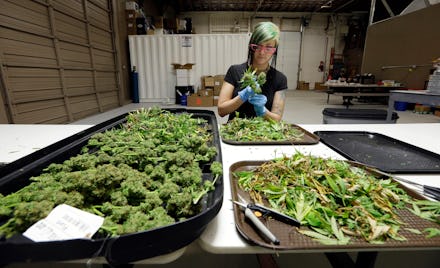This Map Is Going Make Marijuana Legalization Advocates Very, Very Happy

Recreational marijuana will be legal in 18 states by 2020. That's the projection of a report from market research firm ArcView, a cannabis industry investment and research firm based in Oakland, California.
Funded by pro-marijuana legalization groups, ArcView's analysis of potential market growth for the burgeoning U.S. marijuana industry closely follows the projections for the Marijuana Policy Project, which helped establish legal marijuana in Colorado and is already preparing for legalization votes in states like Nevada and Rhode Island over the next two years.
The Marijuana Policy Project is a bit more cautious in its outlook: It believes that only 12 states could plausibly join Colorado, Washington, Oregon and Alaska in legalizing recreational marijuana usage by 2017.
"Unlike ArcView (whose executive director sits on the project's board), they're not banking on legalization taking root in Montana, New Jersey or Connecticut over the next few years, according to spokesperson Morgan Fox," Time's Katy Steinmetz wrote. "He says they're concentrating current efforts in Arizona, California, Maine, Massachusetts and Nevada. They see Texas — yes, Texas — as an outside possibility."
A wave of legalization could mean big money. ArcView found that the U.S. market for legal cannabis grew 74% in 2014 to $2.7 billion, up from $1.5 billion in 2013. Five states have markets greater than $100 million, while one additional state posted sales above the $50 million mark.
But based on the existing markets, ArcView projects that full legalization of marijuana nationwide would result in $36.8 billion in retail sales, larger than the $33.1 billion U.S. organic foods market.
"In the last year, the rise of the cannabis industry went from an interesting cocktail conversation to being taken seriously as the fastest growing industry in America," Troy Dayton, CEO of ArcView Group, said. "At this point, it's hard to imagine that any serious businessperson who is paying attention hasn't spent some time thinking about the possibilities in this market."
So will it happen? Industry groups like ArcView and advocacy organizations like the Marijuana Policy Project see marijuana legalization as an inevitability — and public opinion isn't as settled. A Pew Research Center report from October 2014 showed widespread and growing support for marijuana legalization, with support for legalizing marijuana skyrocketing from just over 30% at the start of the millennium to 52% today.
But legalization isn't a sure bet: A November Gallup poll showed that while a slim majority of Americans favored legalization, many conservatives still balking at the idea, which means that marijuana legalization may turn into the next battleground issue in future elections.
"In 2014, casino magnate Sheldon Adelson proved that there is a Republican with deep pockets willing to spend big to fight against legalization," Steinmetz wrote. "In Florida's midterm election, voters considered an amendment to legalize medical marijuana, and Adelson shelled out at least $5.5 million to defeat the measure. It failed by a 2% margin, just shy of the 60% required to pass."
In the case of marijuana legalization, demographics seem to be destiny: A majority (63%) of millennials support legalization and baby boomers and Generation Xers are quickly getting on board, with over half of both generations supporting the legalization of recreational marijuana. Support for legalization initiatives is only likely to increase as more and more young people exercise their right to vote.
ArcView claims in their report that 2014 will be remembered as a year when "a sense of inevitability about national legalization became conventional wisdom among elected officials and the general public." But while the future of marijuana legalization looks bright, the fight for a sensible drug policy is far from over.